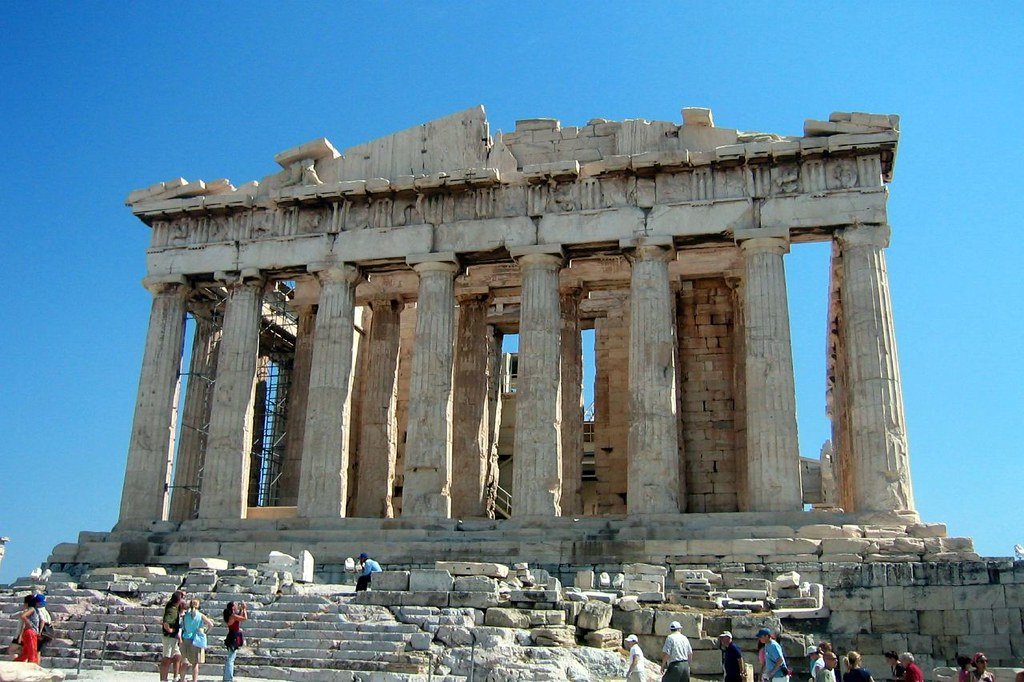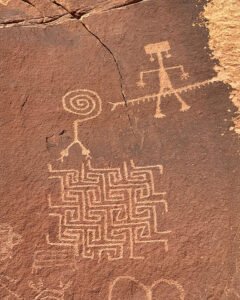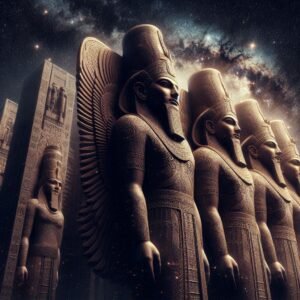 The background to Socrates’ death sentence in 399 BC is both fascinating and complex, reflecting the political and social climate of ancient Athens. Overall, it can be seen that truth, even when the desire for it is being expressed, can be too hard to take, for a society that comes to realise the truth they have been blindly following, needs to be tested.
The background to Socrates’ death sentence in 399 BC is both fascinating and complex, reflecting the political and social climate of ancient Athens. Overall, it can be seen that truth, even when the desire for it is being expressed, can be too hard to take, for a society that comes to realise the truth they have been blindly following, needs to be tested.
The Trial and Execution of Socrates
Context of Athenian Democracy: Athens was a vibrant city-state known for its democratic ideals, but it was also a time of political turmoil. The aftermath of the Peloponnesian War (431-404 BC) left the city divided and wary of dissenting voices.
Democratic Ideals vs. Political Turmoil: Athens was a democracy, but it was a democracy with limitations. While citizens had the right to participate in government, there was also a strong sense of social conformity and a fear of challenging the established order.
Post-War Anxiety: The Peloponnesian War had been a devastating conflict for Athens. The city had lost many lives, its economy was weakened, and its political landscape was unstable. This created a climate of suspicion and fear, making people more sensitive to dissenting voices.
Socrates as a Threat: Socrates’ questioning of traditional beliefs and his influence on young minds were seen as a threat to this fragile social order. His critics argued that he was undermining Athenian values and encouraging young people to rebel against authority.
Trial by Jury: The fact that Socrates was tried by a jury of his peers highlights the democratic nature of Athens. However, the jury was also influenced by the political climate and the fear of instability.
Conviction and Execution: Socrates’ conviction and execution demonstrate how a democracy can be vulnerable to fear and the suppression of dissent. Even though he was a prominent figure, he was ultimately condemned by the very system he had challenged.
Socratic Method: Socrates was renowned for his unique approach to philosophy, often engaging in dialogues that questioned the status quo. He encouraged critical thinking and self-examination, which sometimes made powerful figures uncomfortable.
Charges Against Socrates: He was accused of impiety (asebeia) and corrupting the youth. The charge of impiety stemmed from his questioning of traditional Athenian beliefs and the gods, while the corruption of youth referred to his influence on young men, including notable figures like Plato and Alcibiades. Increasingly, Socrates was asking people exactly what evidence they had for their beliefs.
The charges against Socrates—impiety (asebeia) and corrupting the youth—are deeply rooted in the social and political context of ancient Athens. Here’s a detailed background on these charges and the applicable laws at the time:
Background to the Charges
Impiety (Asebeia)
Definition: Impiety refers to a lack of reverence for the gods recognized by the state. In Athens, this was a serious offense, as the city-state’s identity was closely tied to its religious practices.
Socrates’ Actions: Socrates often questioned the existence and nature of the traditional gods, which was seen as a direct challenge to Athenian religious beliefs. His philosophical inquiries led him to suggest that the gods might not be as the city portrayed them, which alarmed many citizens and leaders.
Cultural Context: The Athenian society was deeply religious, and any deviation from accepted beliefs could be perceived as a threat to social order and stability.
Corrupting the Youth
Definition: This charge implied that Socrates was leading young Athenians away from traditional values and encouraging them to question authority and societal norms.
Influence on Young Men: Notable figures like Plato and Alcibiades were among those who engaged with Socrates. His method of questioning and critical thinking inspired them but also made him a target for accusations of leading them astray.
Political Climate: After the Peloponnesian War, Athens was particularly sensitive to dissent. The fear of instability made Socrates’ influence on the youth seem dangerous to the established order.
Applicable Laws at the Time
The Athenian Legal System: In ancient Athens, private citizens could bring charges against others, rather than the state prosecuting individuals. This meant that personal grievances could lead to serious legal consequences.
Laws on Impiety: The laws regarding impiety were strict. A person could be prosecuted for failing to honour the gods of the city, which was seen as a direct affront to the community’s values.
Laws on Corruption: The charge of corrupting the youth was also taken seriously, as it implied that an individual was undermining the moral fabric of society. This was particularly relevant in a democracy where the youth were seen as the future of the state.
The Trial of Socrates
What Did Socrates Say?
Defence Against Impiety: Socrates argued that he believed in a divine power, which he referred to as a “daimonion” or inner voice guiding him. He claimed that this belief was consistent with the existence of gods, thus countering the charge of impiety.
He questioned the definitions of piety and impiety, suggesting that true piety involves seeking knowledge and understanding rather than blind adherence to tradition.
Defence Against Corrupting the Youth: Socrates contended that he did not corrupt the youth intentionally. He argued that no one would willingly harm their own community or society.
He emphasized that he encouraged young people to think critically and question established norms, which he believed was beneficial for their development.
Evidence Presented
The evidence against Socrates was largely circumstantial and based on the perceptions of his accusers rather than concrete proof. Here are some key points:
Accusers: The main accusers were Meletus, Anytus, and Lycon. They claimed that Socrates was undermining traditional beliefs and leading the youth astray.
Testimonies: Testimonies from various citizens suggested that Socrates’ teachings were seen as dangerous. However, historians note that the accounts from Plato and Xenophon, who aimed to portray Socrates favourably, may have omitted more damaging evidence.
Political Context: Socrates was associated with several controversial figures, including Alcibiades, which may have influenced public opinion against him. His philosophical inquiries were perceived as a threat to the political stability of Athens, especially after the turmoil of the Peloponnesian War.
Factors Discussed in the Case
Several factors played a crucial role in the trial and its outcome:
Political Climate: The aftermath of the Peloponnesian War left Athens in a state of political anxiety. Socrates’ questioning of authority and traditional beliefs was seen as a potential catalyst for unrest.
Public Sentiment: There was a growing sentiment against Socrates among the Athenian populace, who viewed him as a subversive figure. His method of questioning often embarrassed prominent citizens, leading to resentment.
Philosophical Context:
Socrates’ approach to philosophy, which emphasized critical thinking and self-examination, was at odds with the prevailing norms of Athenian society. His insistence on questioning everything was perceived as a challenge to the status quo.
Legal Framework: The Athenian legal system allowed private citizens to bring charges against others, which meant that personal grievances could lead to serious consequences. This system contributed to the political motivations behind the trial.
Impact on Socrates’ Students
The trial of Socrates had significant implications for both Plato and Alcibiades, as they were both associated with him and his philosophical teachings. Here’s a closer look at how the trial affected their lives beyond that pivotal moment:
Implications for Plato
Witness to Injustice: Plato was profoundly affected by Socrates’ trial and execution. He viewed it as a grave injustice and a reflection of the flaws in Athenian democracy. This experience shaped his philosophical outlook and led him to explore themes of justice, governance, and the ideal state in his works.
The Academy: In response to Socrates’ death, Plato founded the Academy in Athens, one of the earliest institutions of higher learning in the Western world. This was a direct attempt to preserve and propagate Socratic thought and philosophy.
Literary Contributions: Dialogues: Plato wrote several dialogues featuring Socrates as a central character, including “Apology,” “Crito,” and “Phaedo.” These works not only serve as historical accounts of Socrates’ trial but also articulate Plato’s philosophical ideas, particularly regarding ethics and the nature of knowledge.
Political Views: Critique of Democracy: Plato became increasingly critical of democracy, believing it could lead to mob rule and the persecution of wise individuals like Socrates. This perspective influenced his later works, particularly “The Republic,” where he advocates for a philosopher-king as the ideal ruler.
Implications for Alcibiades
Political Career: Controversial Figure: Alcibiades was a prominent and controversial political figure in Athens. His association with Socrates, particularly the charge of corruption, complicated his political ambitions. While he was initially a rising star, his reputation suffered due to the trial and subsequent events.
Exile and Return: After the trial, Alcibiades faced political challenges, including exile. He had a tumultuous career, switching allegiances during the Peloponnesian War, which ultimately led to his downfall.
Personal Struggles:
- Influence of Socratic Thought: Despite his political ambitions, Alcibiades struggled with the moral and ethical implications of Socratic philosophy. Socrates had attempted to guide him towards a more virtuous life, but Alcibiades often succumbed to his desires for power and pleasure, leading to a life marked by scandal and controversy.
- Complex Relationship: Alcibiades’ relationship with Socrates was complex. While he admired Socrates, he also felt the weight of the accusations against him. His life after the trial was characterized by a struggle between his philosophical ideals and his political ambitions.
Exile and Ostracism in Ancient Greece
In ancient Greece, particularly in Athens, political exile was a significant aspect of the political landscape, and it was often viewed differently than we might perceive it today. Here’s a closer look at how exile functioned in that context:
Political Exile in Ancient Greece (Ostracism)
Definition: Ostracism was a formal procedure in which citizens could vote to exile a person from Athens for 10 years. This was not a permanent banishment but rather a temporary measure to protect the city from perceived threats.
Purpose: The aim was to prevent any individual from gaining too much power or influence, which could destabilize the democratic system. It was a way for the populace to maintain balance and control.
Common Practice
Frequency: Exile was a relatively common political tool. Many prominent figures, including politicians and generals, faced ostracism at various points in their careers. It was not seen as a total destruction of one’s life but rather a political manoeuvre.
Examples: Notable figures like Aristides and Themistocles were ostracized at different times, yet they often returned to political life after their exile.
Social Perception of Ostracism
Not Permanent Ruin: While exile was certainly a serious consequence, it was often viewed as a temporary setback rather than a complete end to one’s life or career. Many exiles maintained their status and could return to Athens after their period of ostracism.
Reintegration: Upon returning, many exiled individuals could regain their political standing and influence, indicating that society allowed for redemption and reintegration.
Impact of Ostracism on Lives
Political Opportunities: For some, exile could even lead to new opportunities. Individuals could gain experience or support in other city-states, which might enhance their political capital upon return.
Personal Growth: The time spent in exile often allowed individuals to reflect on their political strategies and philosophies, potentially leading to more thoughtful approaches upon their return.
Trial and Conviction: Socrates was tried by a jury of his peers. Despite his defence, which emphasized the pursuit of truth and virtue, he was found guilty. The trial is famously depicted in Plato’s dialogues, particularly in “Apology.”
The Socratic Method: A Dialogue of Discovery
Questioning Everything: Socrates believed that true knowledge could only be attained by relentlessly questioning assumptions, beliefs, and even the very definitions of things. He used a series of probing questions to expose inconsistencies and contradictions in people’s thinking.
Elenchus (Refutation): The core of the Socratic Method is “elenchus,” which means “refutation.” Socrates would engage in dialogues, not to prove his own point, but to help others discover the flaws in their own reasoning.
Turning the Tables: He often used a technique called “turning the tables.” He would ask his interlocutors to define a concept, then use their own definition against them to reveal contradictions or limitations in their understanding.
Knowledge Through Self-Examination: Socrates believed that true knowledge could not be imparted by a teacher but had to be discovered through a process of self-examination. He encouraged people to look within themselves and question their own beliefs.
Why Powerful Figures Found it Uncomfortable
Challenging Authority: Socrates’ questioning often challenged the authority of those in power, including politicians, religious leaders, and even those who held traditional beliefs. His method exposed the flaws in their reasoning and challenged their authority to define truth.
Unmasking Ignorance: Socrates was not afraid to expose the ignorance of even the most prominent figures. His relentless questioning often revealed that people thought they knew more than they actually did, which could be embarrassing and humiliating.
Undermining Social Order: By encouraging critical thinking and self-examination, Socrates could be seen as undermining the social order. He encouraged people to question established norms and traditions, which could lead to instability and unrest.
The Legacy of the Socratic Method
Foundation of Western Philosophy: The Socratic Method laid the foundation for Western philosophy. It became a cornerstone of critical thinking, intellectual rigor, and the pursuit of truth.
Empowering Individuals: By encouraging people to question authority and think for themselves, Socrates empowered individuals to challenge the status quo and seek their own understanding of the world.
Enduring Relevance: The Socratic Method remains relevant today, as it encourages critical thinking, open-mindedness, and the pursuit of truth in a world that often relies on unquestioned assumptions and received wisdom.
He was a master at exposing the inconsistencies and hidden agendas behind laws and societal norms that seemed perfectly acceptable on the surface.
Unmasking Hypocrisy: Socrates wasn’t afraid to point out the hypocrisy inherent in many laws and beliefs. He would ask people to define terms like “justice,” “piety,” or “courage,” and then use their own definitions to show how their actions contradicted their stated ideals.
Exposing the “Why”: Socrates wasn’t content with simply accepting what people said. He wanted to understand the underlying motivations behind their beliefs and actions. He would ask “Why?” repeatedly, pushing people to delve deeper into their reasoning and expose their true intentions.
The Power of Dialogue: Socrates’ method relied heavily on dialogue. He wouldn’t simply lecture people; instead, he would engage them in conversations, leading them through a series of questions that forced them to confront their own inconsistencies and biases.
Uncovering the Unintended Consequences: By probing into the “why” behind laws and beliefs, Socrates often revealed unintended consequences. He would expose how seemingly well-intentioned actions could lead to harmful or unjust outcomes.
Examples of Socrates’ Approach
The Euthyphro Dilemma: Socrates questioned Euthyphro about the nature of piety, leading to the famous dilemma: Is something pious because the gods love it, or do the gods love it because it is pious? This exposed the circular reasoning and lack of clarity in Euthyphro’s understanding of piety.
The Trial of Socrates: Even in his own trial, Socrates used his method to expose the hypocrisy of his accusers. He questioned their motives and challenged their understanding of justice, revealing the inconsistencies in their arguments.
Socrates’ Legacy
The Importance of Critical Thinking: Socrates’ method reminds us of the importance of critical thinking and questioning authority. It encourages us to examine the underlying motivations and consequences of laws, beliefs, and actions.
The Pursuit of Truth: Socrates believed that the pursuit of truth was essential for a good life. His method, while sometimes uncomfortable, was ultimately aimed at helping people understand themselves and the world around them more clearly.
Socrates and Divine Guidance
Claim of Divine Inspiration: Socrates often referred to a “daimonion,” a divine inner voice or spirit that guided him in his actions and decisions. He claimed this guidance was a form of divine inspiration that directed him away from wrongdoing and towards the pursuit of truth.
Philosophical Context: His method of questioning and critical thinking was rooted in a quest for knowledge and virtue, which he believed was divinely inspired. This approach was not entirely foreign to Athenian thought, as many philosophers and poets spoke of divine inspiration.
Athenian Society’s Response
Scepticism of Divine Claims
While Socrates’ claims of divine guidance were not unheard of, they were met with scepticism. Many Athenians were wary of anyone who claimed to have a unique connection to the divine, especially if it contradicted traditional beliefs and practices.
The Athenian pantheon was deeply ingrained in society, and questioning the gods or claiming a personal divine connection could be seen as a challenge to the established order.
Accusations of Impiety
Socrates was charged with impiety (asebeia) partly because his claims of divine guidance were perceived as undermining the traditional gods of Athens. His method of questioning the nature of piety and morality was seen as a direct affront to the religious norms of the time.
The accusers, particularly Meletus, argued that Socrates’ teachings led people away from the worship of the established gods, which was a serious offense in a society that valued religious conformity.
Public Perception
Many citizens viewed Socrates as a subversive figure. His relentless questioning often embarrassed prominent citizens and challenged their authority, leading to resentment and a desire to silence him.
The political climate following the Peloponnesian War heightened fears of dissent and instability, making Socrates’ claims of divine guidance seem dangerous to the social order.
Arguments Against His Inspiration
Contradictory Claims:
Critics pointed out the contradictions in Socrates’ claims. For instance, if he was guided by a divine force, how could he also be accused of corrupting the youth? This led to questions about the legitimacy of his inspiration.
Some argued that if Meletus acknowledged Socrates’ divine guidance, it undermined the accusation of impiety, creating a paradox that his accusers struggled to resolve.
Cultural Context: The Athenian society valued public consensus and adherence to traditional beliefs. Socrates’ individualistic approach to divine inspiration clashed with the communal understanding of religion, leading to a lack of recognition of his muse.
His philosophical inquiries were often seen as a threat to the moral fabric of society, which made it difficult for people to accept his claims of divine guidance.
While Socrates claimed to be guided by a divine inner voice, Athenian society was largely sceptical of such claims. His method of questioning and the implications of his teachings were perceived as challenges to the established norms and beliefs, leading to accusations of impiety and corruption. The tension between his philosophical approach and the societal expectations of the time ultimately contributed to his trial and execution.
There is a fascinating point about the role of the Oracle of Delphi in Socrates’ life and the perception of divine guidance in ancient Athens. The Oracle was a significant figure in Greek society, often consulted for wisdom and prophecy.
The Oracle of Delphi and Socrates
The Prophecy: The Oracle of Delphi proclaimed that Socrates was the wisest man in Athens. This statement was relayed to Socrates through one of his friends, Chairephon. When Socrates learned of this, he was perplexed and did not accept the title with pride or arrogance.
Socrates’ Response: Instead of boasting, Socrates embarked on a quest to understand the meaning behind the Oracle’s proclamation. He began to question those who were reputed to be wise, including politicians, poets, and craftsmen, only to find that many of them lacked true wisdom. This led him to conclude that his wisdom lay in recognizing his own ignorance.
Philosophical Implications:
Socrates interpreted the Oracle’s statement as a challenge to seek knowledge and truth rather than a declaration of superiority. He famously stated, “I know that I know nothing,” which encapsulated his approach to wisdom and learning.
Impact on His Trial: The Oracle’s declaration contributed to Socrates’ reputation and the perception of him as a subversive figure. His method of questioning and challenging established norms was seen as a threat to the traditional values upheld by Athenian society. This, combined with the political climate of the time, ultimately led to the charges against him.
The Role of Divine Guidance
Divine Inspiration vs. Human Wisdom: While Socrates claimed to be guided by a divine inner voice (the daimonion), the Oracle’s endorsement complicated the public’s perception of him. Many Athenians viewed his claims of divine guidance with scepticism, especially when they contradicted established beliefs and practices.
Cultural Context: In a society that valued public consensus and adherence to traditional religious practices, Socrates’ individualistic approach to divine inspiration was often met with resistance. His philosophical inquiries were perceived as a challenge to the moral fabric of society, making it difficult for people to accept his claims of divine guidance.
Conclusion
The Oracle of Delphi therefore played a crucial role in shaping Socrates’ identity and philosophical journey. While the Oracle’s proclamation suggested a form of divine endorsement, it also set the stage for the scepticism and challenges he faced in Athenian society.
The relationship between belief in the gods and the philosophical inquiries of figures like Socrates indeed reveals a complex landscape of thought.
Atheism in Ancient Greece
Diverse Beliefs: Ancient Greece was not monolithic in its religious beliefs. While many adhered to the traditional pantheon of gods, there were also significant currents of scepticism and atheism.
Philosophers like Epicurus, Democritus, and Lucretius expressed ideas that questioned the existence of the gods or reinterpreted their roles in a more naturalistic framework.
scepticism Towards the Divine:
Many Greeks, including playwrights and philosophers, expressed doubts about the gods. This scepticism was often reflected in literature and philosophical discourse, suggesting that not everyone accepted the divine narratives at face value.
The Oracle of Delphi, while a respected institution, also faced scrutiny. Socrates himself used the Oracle’s proclamation about his wisdom to challenge the very nature of knowledge and belief.
Socrates’ Inconvenient Claims: Socrates’ method of questioning and his claims of divine guidance (through his daimonion) were indeed seen as inconvenient. His approach often led to uncomfortable truths about the inconsistencies in societal beliefs and practices.
By challenging the status quo, Socrates not only questioned the gods but also the moral and ethical frameworks that governed Athenian life. This made him a target for those who felt threatened by his ideas.
The Impact of Atheism on Society
Cultural Tensions: The presence of atheistic views created cultural tensions. Traditionalists viewed scepticism as a threat to social order and morality, fearing that it could lead to chaos and a breakdown of societal norms.
Atheism was often associated with immorality in the Greek mind, leading to the belief that it could result in divine retribution and a loss of law and order.
Philosophical Discourse: The philosophical debates surrounding the existence of the gods contributed to a rich intellectual environment. Thinkers like Socrates encouraged critical examination of beliefs, which laid the groundwork for later philosophical developments.
This discourse also reflected a broader human tendency to seek understanding beyond mere acceptance of tradition, fostering a culture of inquiry that would influence future generations.
The interplay between belief and scepticism in ancient Greece was complex. While many adhered to traditional religious practices, there was a significant undercurrent of doubt and philosophical inquiry that challenged these beliefs. Socrates’ claims and methods were indeed inconvenient for the prevailing views, as they forced society to confront uncomfortable truths about their beliefs and the nature of divinity.
The scepticism that emerged during this period can be attributed to several factors, many of which were reflected in the literature, plays, and philosophical discourse of the time. Here are some key reasons for this disillusionment:
Philosophical Inquiry
Critical Examination: Philosophers like Socrates, Plato, and Aristotle encouraged critical thinking and questioning of traditional beliefs. Their inquiries often led to doubts about the nature and existence of the gods.
Protagoras’ Agnosticism: The famous saying by Protagoras, “I don’t know whether the gods exist or not,” reflects a growing scepticism among thinkers who questioned the certainty of divine existence.
Literary Representations
Tragedies and Comedies: Greek playwrights like Euripides and Aristophanes often portrayed the gods in a way that highlighted their flaws and inconsistencies. For example:
- Euripides questioned the morality of the gods in his plays, suggesting that divine actions were not always just or benevolent.
- Aristophanes used humour to critique the gods, portraying them as capricious and unreliable, which undermined their authority.
Mythological Critique: Many works of literature began to reinterpret myths, presenting the gods as fallible beings rather than perfect entities. This shift contributed to a more sceptical view of divine narratives.
Cultural and Social Changes
Political Turmoil: The aftermath of the Peloponnesian War led to a questioning of traditional values and beliefs. The instability of the time made people more open to scepticism about the gods who were thought to protect the city-state.
Rise of Individualism: As individual thought became more valued, people began to rely less on communal beliefs and more on personal reasoning, leading to a decline in unquestioned faith in the gods.
Epistemic Limitations
Recognition of Human Limitations: Many thinkers acknowledged the limitations of human knowledge and understanding. This recognition led to a more cautious approach to claims about the divine, fostering scepticism.
Xenophanes’ Critique: The philosopher Xenophanes famously critiqued the anthropomorphic portrayal of gods, arguing that humans project their own traits onto divine beings, which raises questions about the nature of those gods.
Scepticism in Poetry
Attribution of Fate: Early Greek poetry often attributed events to fate or the whims of the gods, suggesting a lack of control over one’s destiny. This perspective could lead to disillusionment with the gods, as they seemed capricious and indifferent to human suffering.
Philosophical Poems: Works that explored the nature of existence and the divine, such as those by Pindar and Hesiod, often reflected a tension between belief and scepticism, contributing to a more nuanced understanding of the divine.
Conclusion
The scepticism towards the gods in ancient Greece was influenced by a combination of philosophical inquiry, literary representations, cultural changes, and a growing awareness of human limitations. These factors collectively fostered a climate of doubt and critical examination of traditional beliefs, leading to a more complex relationship with the divine.
The Decline of Greek Society
It’s a fascinating irony that Socrates, in his quest for truth and discernment, may have inadvertently contributed to the decline of Greek society.
The Power of Unnatural Beliefs
Cognitive Dissonance: Deeply ingrained beliefs, even if they’re not based on evidence, can create a powerful cognitive dissonance. People develop elaborate coping mechanisms to reconcile these beliefs with their experiences, often without realizing the extent to which their worldviews are built on shaky foundations.
The Comfort of Certainty: Unquestioned beliefs provide a sense of security and belonging. They offer a framework for understanding the world and navigating life’s complexities. Challenging these beliefs can feel like a threat to their identity and stability.
Socrates’ Unintended Consequences
Overwhelm and Resistance: When Socrates challenged people’s deeply held beliefs, he often encountered resistance and overwhelm. His questioning could be disorienting, especially for those who relied heavily on their traditional beliefs for meaning and purpose.
The Power Vacuum: By exposing the flaws in traditional beliefs, Socrates may have created a power vacuum. Without a strong foundation of shared values and beliefs, Greek society became vulnerable to internal divisions and external threats.
The Loss of Inspiration: When people lose faith in their gods and their beliefs, they can also lose their sense of inspiration and purpose. This can lead to a decline in creativity, innovation, and civic engagement.
The Irony of Socrates’ Legacy
The Seeds of Enlightenment: While Socrates may have contributed to the decline of Greek society, he also laid the groundwork for the Enlightenment. His emphasis on reason, critical thinking, and the pursuit of truth became foundational principles for later thinkers.
The Ongoing Struggle: The tension between faith and reason, between tradition and progress, continues to shape societies today. Socrates’ legacy reminds us of the importance of questioning, but also of the need to find a balance between challenging beliefs and preserving the values that hold communities together.
The Need for Balance:
Openness and Critical Thinking: Socrates’ example encourages us to be open to new ideas and to critically examine our beliefs. However, we must also recognize the importance of shared values and a sense of community.
Has Anything Changed?
Today, there is a crucial point to understand about the complex relationship between belief, scepticism, and societal stability. Socrates’ legacy reminds us that progress often comes with challenges, and that the search for truth can be a double-edged sword.
Adopting openness and critical thinking in today’s society can lead to a variety of responses and outcomes. But these can be tied into particular social classes, since the perceived and actual cost of openness often differs based on the level of financial independence and social stability that the individual perceives they have.
Personal Growth and Development
Enhanced Understanding: Individuals who embrace critical thinking often experience personal growth. They become more adept at analysing situations, understanding different perspectives, and making informed decisions. However, children who question their parents “too much”, are often abused because of it. Critical thinking requires the other person to be open to hear that thinking and question themselves openly. Most people cannot do this, and social status tends to mean that only the more wealthy individuals will be surrounded by freer thinking peers.
Increased Confidence: Engaging in critical thinking can boost self-confidence as individuals learn to trust their reasoning and judgment. However, again, whilst this is true, it is also true that society is filled with incongruence. A friend that suggests you go to the Doctor, for help, may well reject you, if you end up with the “wrong” diagnosis. Applying critical thinking in the wrong situation can cause further abuse, and lead to lower self-confidence.
Social Interactions
Open Dialogue: People who practice openness are likely to foster more meaningful conversations. They encourage discussions that explore diverse viewpoints, which can lead to richer understanding and collaboration.
Resistance from Others: Not everyone may welcome this approach. Some individuals might feel threatened by challenges to their beliefs, leading to defensiveness or conflict. In fact, society as a whole has in general, stopped most open and public free-thinking dialogues. Trolls, hackers and spammers have meant that most people in social environments are very wary of giving others ammunition to use against them.
Community Engagement
Promoting Inclusivity: A critical thinker can advocate for inclusivity and understanding within their community, encouraging others to consider multiple perspectives and engage in constructive dialogue.
Potential Backlash: In some cases, communities may resist changes brought about by critical thinking, especially if it challenges long-held traditions or beliefs.
Workplace Dynamics
Innovation and Problem-Solving: In professional settings, openness and critical thinking can lead to innovative solutions and improved teamwork. Employees who think critically are often better at navigating complex problems.
Challenges to Authority: This approach may also lead to challenges against established norms or authority figures, which can create tension in hierarchical organizations.
Educational Impact
Encouraging Curiosity: In educational environments, fostering critical thinking encourages students to ask questions, seek evidence, and engage deeply with material, leading to a more enriching learning experience.
Resistance to Change: Educational institutions may face challenges in implementing critical thinking curricula, especially if traditional methods are deeply entrenched.
Cultural Shifts
Shaping Public Discourse: As more individuals adopt critical thinking, it can lead to a cultural shift towards valuing reasoned debate and evidence-based discussions in public discourse.
Polarization: Conversely, the rise of critical thinking can also exacerbate polarization, as differing viewpoints become more pronounced and entrenched.
Adopting openness and critical thinking today can lead to personal empowerment, enhanced social interactions, and community engagement, but it can also encounter very stiff resistance and polarization if those free thoughts are expressed in the wrong environment and to the wrong people. The balance between challenging beliefs and fostering understanding is crucial in navigating these dynamics.
Questioning authority can lead to a variety of outcomes, depending on the context, the nature of the authority being questioned, and the societal norms in place. Here are some common negative consequences that individuals may face when they challenge authority:
Retaliation: Questioning authority can provoke anger or retaliation from those in power. This may manifest as disciplinary action, social ostracism, or even legal consequences, depending on the severity of the challenge.
Isolation: Individuals who question authority may find themselves isolated from their peers or community, especially if their views are not widely accepted. This can lead to feelings of loneliness and frustration.
Stress and Anxiety: The act of challenging authority can create significant stress and anxiety, particularly if the individual fears repercussions or feels unsupported.
Resistance from Others: Some individuals may resist or push back against those who question authority, leading to tension and conflict within groups or organizations.
Gaslighting and Scapegoating: Individuals questioning the wrong thing, may well find themselves the target of Gaslighting and other methods, subtle or much less so. Aimed ate preventing the individual from destabilising society, or even the individuals that are carrying out the gaslighting. Usually, a self-policing isolationist is trying to hide form their people-policing acquaintances and other contacts.
Clearly society today is still struggling to come to terms with secret “truths” that cause biases which tend to cause each biased individual to attempt to stifle what is perceived as “Taboo” topics and ways of thinking and feeling.
Subscribe to our post updates - Don't miss a thing!!







